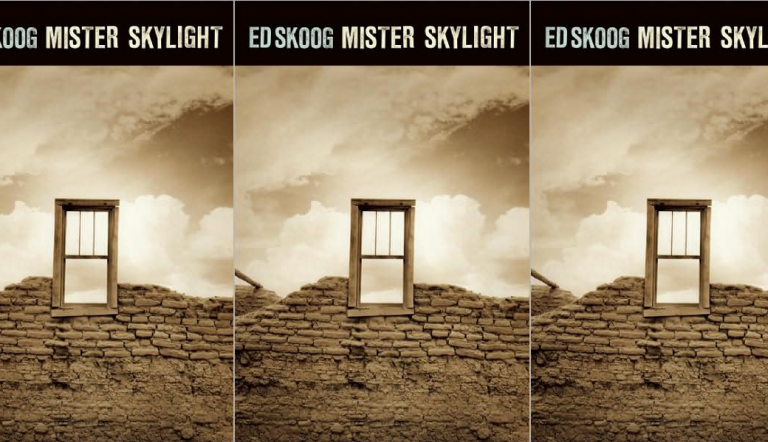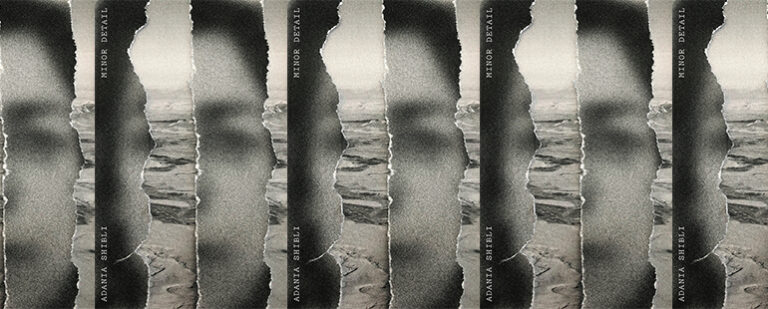Interview with Ed Skoog

Weston Cutter, our second guest blogger, will post on Wednesdays through April. Weston is a poet whose poem “The Invention of Color vs. The Song of EA” appears in our Winter 2010-11 issue edited by Terrance Hayes.
Ed Skoog’s freakishly excellent debut Mister Skylight was one of 2009’s books which desocked me in pretty phenomenal ways, and I’m not sure I could fairly describe its repercussions here. Maybe this: the best poetry in fundamental ways alters time and noise for the (or, at least, this) reader—speeding or slowing or radically sidewaysing time, muffling or echoing or bass/and/or/trebling noise—and Skoog’s Skylight somehow located me, in speed and sound, just a step outside of loud-ish and speedy places. Does that make sense? Reading Mister Skylight felt awesomely akin to being behind a full building, or being at water’s edge, some good time behind you. Skoog’s poetry is patient and kind and exceptionally generous—as, it turns out, he also seems to be, given the answers he gave to these questions sent early December, 2010.
Cutter: If you were writing in another genre, who’d you like to write like and why? Who do you dig in fiction or non? Would you want to write like that? Do you presently want to?
Skoog: Style is at the center of it. I read and admire fiction, and have written it as long as I’ve written poetry, but the results have never been very satisfying to me or readers. I will keep trying; it’s a long process for me, and if perceived correctly, the personal challenge is learning to make poetry and fiction one thing. Process is my problem: I go about poetry mostly by intuition and ear, and haven’t (so far) learned how to trust these instincts in prose. Three fiction writers who I feel moved to emulate are Peter Handke, Michael Ondaatje, and Sigrid Nunez (whose For Rouenna is a masterpiece). And of course Walser, Kafka, J. Roth, Musil, Tolstoy, Dickens, Faulkner, Sebald. I like a novel that fails as a novel but succeeds as a poem. (Conversely, I am usually unmoved by narrative poems.) I am excited by the new work of fiction writers more-or-less my age: J. Robert Lennon, Andrew Sean Greer, Timothy Solon Woodward. Ben Lerner, Tom Franklin, Nami Mun, Tiphanie Yanique, Wells Tower, James Hannaham, Sherman Alexie, Junot Díaz, and am greatly looking forward in 2011 to Leaving The Atocha Station, the first novel by the poet Ben Lerner. Note that many of these fiction writers are also poets, or whose shorter fiction is grounded in metaphor and style.
Cutter: What’s the first sexy or suckering phrase you read which made you point at the page (or whatever) and deep breathe-in and go, shit, that’s what I want to do? And, if you can: what was it about that line?
Skoog: The sixth line of William Carlos Williams’ “The Descent” is just “even” indented to the third tab, balancing “a sort of renewal” and “an initiation, since the places it opens are new places.” Every line of this poem is lodged deep in my being, but looking back, I think much of the power of the poem comes from these short lines, “even” being the shortest, as the line carries as much atomic weight as the other lines, and I feel the poet’s mind most acutely in this mid-articulation. A whole gesture, a whole life, a whole culture right there. It’s like a “zip” in a Barnett Newman painting, something that seems so simple on the surface but any thinking about it all shows the billion choices not made, alternatives turned away from, how visionary it is to be alive and make art. I read this poem when I was sixteen, and it opened the door for me. Another line from that time has also stayed with me, from Public Enemy’s Chuck D: “I don’t rhyme for the sake of riddling.”
from The Descent, by WCW
The descent beckons
as the ascent beckoned.
Memory is a kind
of accomplishment,
a sort of renewal
even
an initiation, since the spaces it opens are new places
Cutter: What’s a poem of yours which has been published, and it’s out and available, but which you’re still not 100% satisfied with? Why?
Skoog: There is one poem that seems sentimental now, too polite: “The Carolers” in Poetry. I am very glad of the wider readership and the publication has given me, and I’m not disavowing the poem, but it seems like a misstep, the poem that dozens of other poets could have written, although the memory at the core (drunk revelers passing through a snowbound car) remains generative and deeply embedded in my mind, very Orphic. I should try to write that poem again.
Cutter: On a different/other track: what’s a thing of yours you’re working on which you can’t seem to nail down? Is there some ‘problem’ you’re working at/toward, consciously, in hopes of solving?
Skoog: Since I started writing poetry as a child I’ve had one object: to see clearly. There are moments of my life that I keep returning to, writing about, and never getting “right,” so I return again and again. A few years ago I wrote a chart of a hundred moments that my mind drifts back to, or that still puzzle me, and I spent the last year relistening to them, some deep listening, that was more of a meditative practice than a writing process, but much of my second book, Migratory Restlessness, (coming out in a few years from Copper Canyon Press) has arisen from this re-seeing, re-listening.
Cutter: Place is huge for you—certainly in the poetry, but especially/even in the nonfiction stuff you write for the Seattle paper. As someone who knows little to say in contributor notes other than “Weston Cutter’s from Minnesota,” I’m curious about what it means, to you, to be from Kansas. Yes to New Orleans and Seattle and a year in DC, but can you write at all about what it means that you’re from Kansas (aside from it being a tongue depressor)?
Your stuff deals in more direct ways with ‘real world’ aspects than lots of other folks (Katrina, say). Wax however you’d like (passionate, poetic, dismissively) on that fact on that aspect, if you’re at all interested.
Skoog: Living in New Orleans, and coming to know it well, changed me from what I was; you might think I’m talking about the wildness but I mean it gave me antidotes to wildness, entrée to an inner reserve, which I think is as great a force in that city as its social and public face. The flooding of New Orleans, and the aftermath, and the rebuilding, radicalized my understanding of America and of poetry, in ways that the poems of Mister Skylight are just beginning to work out. I can’t look at my hometown of Topeka in the same way, or the other places I’ve known or will know in the future—I don’t mean I can’t look at them without love, but towns, people, all human arrangements seem flimsier and more cruel and more dear. Survival is terrible, and places are traps. Ain’t but one place, unless you believe in an invisible world to set beside this one. I use the details of my surroundings, so I include the houses, streets, neighborhoods, towns, cities, roads, lakes, rivers, mountains, oceans, and the people in these houses, streets, etc, that I have seen or read about or imagined. There’s a passage in Robert Stone’s novel A Hall of Mirrors about California vs. “the California of the mind.” Meanwhile, Wallace Stevens writes that “Reality is only the base. But it is the base.” I want to reach the invisible world of the mind, but the only path is through things, that is, reality has to be abandoned. I also think of Christopher Smart, who felt it was the poet’s obligation to praise the world by discernment and enumeration. I love my family and friends, and feel true joy when I can write about them and the places we’ve known together, and, as well, profound, substantive sorrow when recalling people and places, whether they were taken from me, or I abandoned them, I’ve lost.
Cutter: As someone who’s got the same job, I’d love to hear your thoughts on the generative and detrimental aspects of teaching, specifically with regard to writing. I know the easy answer’s that, there’s less time during the year to write, but I’d be curious to hear about how your relationship with your own writing shifts because of/with/through your students and your job.
Skoog: Teaching is OK. I’ve mostly been a high school teacher, with a few college stints. But I try to keep in mind H.L. Mencken’s warning to writers not to become respectable. Teaching is a respectable profession, and that’s inhibiting. It certainly allows me plenty of time to write, and I like the structure teaching provides, how it requires me to stay sharp with my ideas and reading. I like to talk, so teaching satisfies that need. Talking about poetry stimulates thinking about poetry, which ends up on the page. I have been lucky to have a few students who are smarter and more talented than me, and I’ve learned as much from them as from my own teachers. Teaching has kept me out of other forms of oratory, which I would have enjoyed but would have had nothing to do with poetry; I very narrowly avoided working in politics after college, as I’d served, weirdly,—and served weirdly—as student body president. Dedication to poetry was my blueprint out of that foolishness. I wanted to be a zookeeper when I graduated from high school, and that intention was part of why I went to my state’s ag school rather than its liberal arts college, where I probably would have been more indulged as a poet—there was always considerable, useful resistance, which forced me to find a tight, protective cadre, and encouraged the stubbornness which has been essential. Yet zookeeping was a well-informed trajectory, as one of my brothers had been a zookeeper before becoming a veterinarian, and I worked at the World Famous Topeka Zoo (that’s what it called itself) all through high school. I should have become a zookeeper; I would have liked that. That would also have been generative.
Cutter: Can you talk at all about other art forms that find their way into your creative working headspace? Music or films or movies or anything? I’ve got a feeling this pull isn’t as strong as, say, bodies of water in your work, but I’d be curious.
Skoog: As I near 40, my head is so full of movies, music, paintings, TV shows, YouTube clips, etc. that I can’t sort it all out. I play banjo fairly seriously. New Orleans R&B is always just below the surface, whatever’s streaming online at WWOZ.org. What art/music/film/etc. that has lodged deep in my gray matter seems to share a theme, one of vast sloppiness, like the mandolin playing of Bill Monroe that is almost unbearably precise yet ultimately can’t be contained by or defined by the tune he’s playing. The artist Nate Lowman spoke recently about the aesthetic ideal of the too-big object crammed into a trash can that cannot contain it, and that appeals to me. I find that in the movies of Lindsay Anderson, Orson Welles, Hal Hartley, Wim Wenders, and Werner Herzog; in the paintings of Philip Guston, Gina Phillips, and Clayton Colvin; the photography of Michel Varisco; the sculpture of Noah Purifoy, John Scott, William Wiley, David Reid-Marr, Rob Rutherford; the drawings of Charles Burns and Brad Benischek; the whole enterprise of the Museum of Jurassic Technology. Certainly in the psychedelia of The Flaming Lips, particularly the song at the core of their long career, “Prescription: Love” on their 1987 album O My Gawd!!!
Cutter: Speaking of bodies of water: my friends and I all grew up on the bluffs of the Mississippi, and each of us is either still presently living near/on a river, or we’re desperately trying to find our way back to living by a river (because, I believe, there’s something critical about what sort of body of water one grows up understanding, and it’s influential forever—there’s something about living beside the oblivion of an ocean, beside the always-go of a river). Does this hold up for you? Maybe I’m just obsessed with water.
Skoog: I grew up with the Kansas River (also called the Kaw) a few blocks to the north, and went to college where the Big Blue and the Republican rivers join to form the Kaw. Grad school was on the banks of the Clark Fork River, which was full of trout, and I spent a lot of time fishing the Blackfoot, Jefferson, Yellowstone, and Firehole. In New Orleans I lived near the Mississippi, of course, and late at night could feel the vibrations of ship engines. My wife and I were married by a friend who was a riverboat captain. In California, we lived along Strawberry Creek on Mount San Jacinto; the creek went through an enormous canyon and dried out in the desert. Now I live not far from Puget Sound, on a boulevard paved above Ravenna Creek, which used to drain Green Lake into Lake Washington. Our basement floods sometimes with its ghost.

